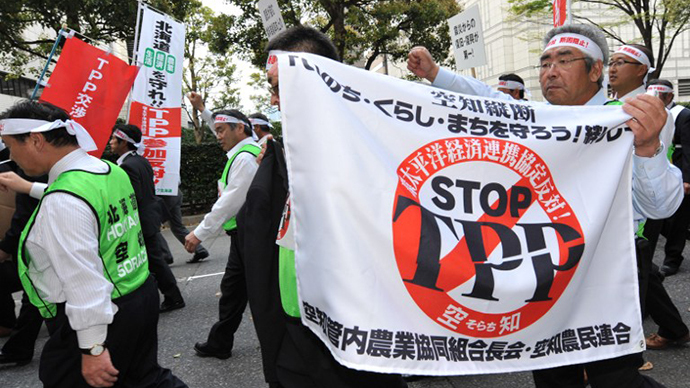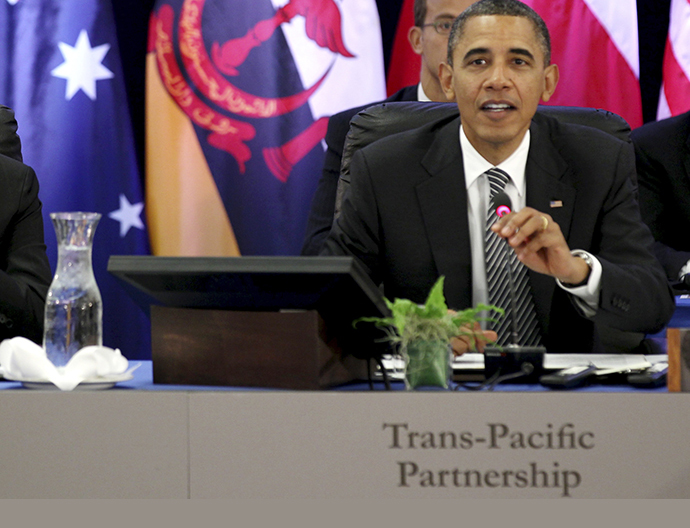Trans-Pacific partnership: Neoliberal arm of Obama’s Asia-pivot

Washington’s secrecy on everything from the drone program to its Prism-style wire-tapping is seen again in an upcoming US trade deal with several Pacific Rim countries. And it’s not just secretive - it’s probably the scariest thing you’ve never heard.
So what makes the Trans-Pacific Partnership deal (TPP) so unsavory? To start, a few hundred representatives of major multinational corporations have designed the substance of the draft text, and most media outlets have imposed a near-total blackout on coverage of the successive rounds of negotiations that take place every few months in different parts of the world.
Members of the US Congress that should rightfully have jurisdiction over the draft text have so far been denied access to it, prompting Senator Ron Wyden of Oregon to introduce a bill calling for the US Trade Representative’s office to disclose its TPP text to Congress.
Wyden was quoted in a statement saying “The majority of Congress is being kept in the dark as to the substance of the TPP negotiations, while representatives of U.S. Corporations - like Halliburton, Chevron, PHRMA, Comcast, and the Motion Picture Association of America - are being consulted and made privy to details of the agreement… More than two months after receiving the proper security credentials, my staff is still barred from viewing the details of the proposals that USTR is advancing."
So why exactly would Obama’s closed-door policies be extended to a seemingly innocuous trade deal? Primarily because, if signed into law, the TPP would impose punishing regulations that give multinational corporations and the Wall St. consensus an unprecedented leg up in deciding how international trade is conducted between signatory countries.
‘Shock and awe’ globalization
Everything that the public knows about the TPP so far has come
from various leaks, and if the final agreement looks anything
like the negotiating text, the implications would be far
reaching, affecting everything from the cost of medicines to
internet freedoms by broadening international copyright and
intellectual property rights legislation in line with US
law.
Make no mistake – the TPP is a neoliberal wish list that would
empower corporations to skirt national laws and courts, while
directly challenging health, environmental and other public
interest policies. What makes the TPP so alarming is that it aims
to create judicial authorities higher than national governments,
in the form of extra-judicial tribunals overseen by the World
Bank and UN. If multinationals feel that existing government
policy has hindered their expected future profits, national
governments would be obliged to dole out compensation with
taxpayer dollars. If the TPP were to be passed into law, it
would:
- create incentives for corporations to offshore millions of jobs & encourage bottom-of-the-barrel low wage conditions in participating countries
- prohibit bans on risky financial instruments, speculation, and derivatives; countries would be banned from enacting capital controls and banks would enjoy significantly less regulatory oversight
- impose strict intellectual property legislation that would undermine access to the internet and digital file-sharing, as well as stymie the product of generic medicines that may violate US patents
- lower food safety regulations and flood markets with those products, empowering corporations to decrease environmental and health safeguards
- make signatory countries accountable to international
tribunals, giving corporations the ability to demand compensation
for any expected future profits that are hindered by existing
national laws.
Like NAFTA, which dismantled the US manufacturing base and led to thousands of job losses, the TPP promotes offshoring through incentives for corporations, leading to wages being driven down and heightened inequality. Pharmaceutical giants would be allowed to increase drug prices and limit consumers’ access to cheaper generic drugs, which is bad news for many of the developing countries taking part.
On the digital front, ISPs could be required to scrutinize user
activity, while the creation and sharing of user-generated
content would be stifled by drastic extensions of copyright
protection. In the financial department, the TPP imposes extreme
deregulation policies that have contributed to the global
economic crisis, while prohibiting countries from enacting
capital controls, an essential policy tool to counter
destabilizing speculative cash flows.
Gulliver & the Lilliputians
While Chuck Hagel and the gang over at the Pentagon are busy
repositioning US military muscle to the Asia-Pacific, the Obama
administration realizes that it must offer Pacific nations – who
would otherwise have greater incentives in deepening economic
ties with China – an attractive stake in the ailing US economy.
The countries involved in the negotiations – Australia, Brunei,
Chile, Canada, Malaysia, Mexico, New Zealand, Peru, Singapore,
Vietnam, and now Japan – include major economic players in
Southeast Asia. The TPP is clearly the economic arm of the ‘pivot
to Asia’ policy, roping strategic economies into a legally
binding corporate-governance regime, lured in by the promise of
unfettered access to US markets.

Many believe that the underlying purpose of Washington’s renewed interest in the Asia Pacific region is to counter the influence of China, which will soon overtake the US as the world’s largest economy. Examining the Beijing-aphobia conjecture of US foreign policy theoreticians like Robert Kagan can provide a clearer understanding of the TPP.
An article penned by Kagan back in 1997, published with our friends at the Brookings Institute, articulates the China-containment narrative that undoubtedly strikes a chord with the policy architects of today. Kagan writes that the “present world order serves the needs of the United States and its allies, which constructed it,” and that “Chinese leaders chafe at the constraints on them and worry that they must change the rules of the international system before the international system changes them.” Kagan also references the literary classic, ‘Gulliver’s Travels’, where an explorer by the name of Lemuel Gulliver finds himself shipwrecked on an island, overtaken by a community of six-inch men called Lilliputians, who have tied him down with ropes and stakes, preventing him from moving. Kagan cites a conversation with Chinese military analysts, where he posits that Chinese leaders worry that they will "play Gulliver to Southeast Asia's Lilliputians, with the United States supplying the rope and stakes." The TPP is the most vivid policy directive that indicates that the US is hoping to deepen its footprint in Southeast Asia to counter the growing economic and military clout of China in the region.
Bears in the house
The TPP is slated to be signed into law later this year, but what, if any resistance has been established to oppose this neoliberal behemoth? The main issue is that most people are in the dark, and are not even aware that the TPP exists. Some notable gains in promoting awareness have been made in recent weeks. Lori Wallach of the advocacy group Public Citizen, which has been a strong voice in opposition to the deal, recently published a critical account of the TPP in the NY Times; Abby Martin also recently covered the deal on her show with RT America.
Across the English-speaking countries involved, there seems to be growing public awareness of the dangers of the TPP, but the strongest bastion of resistance is Japan, the latest country to come onboard for the talks. The loudest voices of dissent in Japan come from the country’s agricultural lobby and rice farmers, who oppose the zero-tariff policy across all industrial sectors and support other protectionist policies that have guarded domestic industries.
Although grassroots movements have not been as strong as those in Japan, several prominent individuals in Malaysia, which will host the next round of TPP negotiations in July, have criticized the trade deal. Among them is former PM Mahathir Mohamad, an ardent opponent of neoliberalism and US hegemony, who has called for Malaysia to reject the TPP.
There is growing skepticism of the deal in Malaysia’s mainstream press and among government and business officials. Hanafee Yusoff of the Malay Chamber of Commerce publicly opposed it, asking “how can Malaysia sign an agreement in which there is such gross inequalities?” Mahathir once likened free trade and total deregulation to a house with all its doors and windows left open, and as a consequence, bears, wolves and other predatory beasts would invite themselves inside.
Only time will tell if certain countries choose to walk away from the negotiations, but if people remain unaware of the TPP now, they will certainly feel the burn when it becomes law.
The statements, views and opinions expressed in this column are solely those of the author and do not necessarily represent those of RT.
The statements, views and opinions expressed in this column are solely those of the author and do not necessarily represent those of RT.













